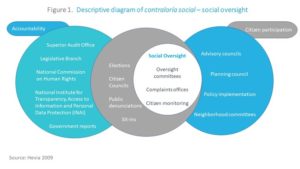Contraloría Social – or “Social Oversight”
Versión en español: Contraloría social
Contraloría social can be defined as institutional mechanisms that permit citizen participation for public accountability (Figure 1). These channels for “social oversight” have two defining features: first, they focus on monitoring and oversight, distinguishing them from other forms of participation such as participatory planning or joint decision-making, and second, their actions are institutional in nature and legally regulated. This differentiates contraloría social from other forms of social accountability, such as denunciations in the press, public protests, or sit-ins at offices (Hevia 2019).

The objective of contraloría social is for citizens – organized into committees – to be able to influence the monitoring and oversight of public works and services. This can be done directly, such as agreeing or refusing to sign off on public works, or indirectly, for example activating grievance systems.
In Mexico, this concept has undergone various changes that can be broken down into three stages.
The first, from its official creation in 1991 until the mid-1990s, was centered on two ideas: contraloría social oversight committees and complaints offices, also known as grievance redress mechanisms (sistemas de atención ciudadana). A second period, beginning with the creation of the Comprehensive System for Contraloría Social and the political transition of 2000, limited “traditional” contraloría social mechanisms to complaints offices known as “citizen attention systems”, but resulted in citizens developing a wide range of tools seeking citizen involvement in oversight. Accordingly, new concepts were created, such as “social witnesses” (testigos sociales), to review transparency in bidding processes, and citizen monitoring to ensure that civil society organizations were using the then recently-passed Law for Transparency and Access to Government Information to monitor and track social programs. By the turn of the 21st century many social organizations and groups identified their monitoring and oversight activities as contraloría social or contraloría ciudadana, understood as forms of social accountability (Hevia 2006).
In 2004 a third stage in the concept’s use began, lasting until the López Obrador administration took office in 2018. This phase began with the inclusion of contraloría social in the General Law on Social Development, which limited participation in citizen oversight to the direct beneficiaries of social programs and prioritized beneficiary committees as the main mechanism for contraloría social. Some years later, following the enactment of Ministry of Public Administration (SFP: Secretaría de la Función Pública) guidelines, monitoring and oversight mechanisms were limited to filling out verification sheets, further restricting their scope for oversight. Moreover, other forms of institutionalized participation geared to accountability that were originally included in the idea of contraloría social, such as social witnesses, became increasingly professionalized. Something similar happened with “citizen monitoring” systems that allowed non-beneficiaries to monitor social programs. This confined contraloría social to activities that were rather administrative in nature, compulsory for beneficiaries of social programs, or to requirements for the construction of public works, rather than involving effective citizen participation actions for accountability, therefore distancing it from the notion of social accountability.[1]
Nearly thirty years after its inception, following a boom of actions and expectations for contraloría social as a social innovation for accountability, the idea maintains its defining characteristics: citizen participation actions for public accountability that are regulated by the government. However, its use has increasingly focused on getting beneficiaries of social programs to comply with administrative requirements, with less attention to involving citizens in monitoring the public sphere with effective oversight tools.
[1] A paradigmatic example is a CIESAS program founded in 2007 as the Centro de Contraloría Social y Estudios de la Construcción Democrática (CCS); later it changed its name to the C.Ciudadano. Construcción y articulación de lo público, dropping the idea of contraloría social.
References
Hevia, Felipe J. 2006. La Contraloría Social Mexicana: participación ciudadana para la rendición de cuentas. Diagnóstico actualizado a 2004. Cuadernos para la democratización 4. Xalapa: CIESAS; Universidad Veracruzana.
Hevia, Felipe J. 2019. “Contraloría Social.”. In Diccionario de Transparencia y Acceso a la Información Pública, edited by Guillermo Cejudo, 80-86. Mexico City: INAI.
Additional resources
For more work by Felipe Hevia, see the November 2019 working paper Educational Accountability or Social Accountability in Education? Similarities, Tensions, and Differences.


